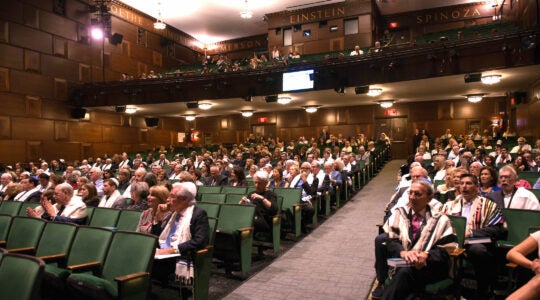“Is it even possible to be an Orthodox woman historian?” The first time I was asked this, I laughed. It had never even occurred to me—then—that it was a serious question. I was a graduate of a Bais Yaakov high school and an elite liberal arts college, enrolled in the top women’s history Ph.D. program in the United States, and very little in my life experience thus far had led me to believe that there was any conflict in this educational biography. Sure, a few of my more yeshivish friends’ parents had raised an eyebrow upon hearing about my plans, and one even gently encouraged me to consider whether becoming a women’s history professor might scare off potential shiddukhim. Didn’t I worry that I would be perceived as a radical (subtext: man-hating) feminist? But even though I rolled my eyes after this conversation, I knew she had what she considered to be my best interests at heart, and she certainly didn’t think I couldn’t pursue whatever career I chose. My highly educated parents, who had moved more than halfway across the country to secure their daughters an Orthodox Jewish secondary education, supported my professional aspirations with no concerns that I would be pulled out of my religious orbit.
My teachers cheerfully accommodated my yom tov-related absences and communication gaps, but it was clear that the very idea of religious observance was exotic at best.
Once I started graduate school, however, I more frequently confronted questions about a perceived conflict between my religious identity and my feminist identity. As far as I could tell, neither my graduate professors nor my doctoral classmates had ever encountered a religious Jew at close range before, and I disrupted their assumptions—if they even had any—about what observant Jews were like. My teachers cheerfully accommodated my yom tov-related absences and communication gaps, but it was clear that the very idea of religious observance was exotic at best. This was particularly true of my women’s history mentors at my home institution and elsewhere, all of whom were wonderfully supportive, but seemed confounded by the idea that a clearly feminist scholar-in-training could be so bound by what they saw as antiquated, patriarchal religious traditions.
I was wary of sharing my own developing ideas about Orthodox Jewish feminism with people who, no matter how well-meaning and genuinely interested, did not have the context for the complex issues that arise when considering these questions. The only person with whom I discussed such matters was another doctoral student, a devout Catholic woman who evoked similar reactions among our professors. We generally shrugged our shoulders and took advantage of the social and religious networks that meant we could always find home hospitality wherever we needed to go for our research, much to the amazement and envy of our peers.
The Question
At my very first academic conference, where I shared a hotel room with a junior faculty member from another institution who had graciously offered to help out any impecunious graduate students who needed housing, there was the question: “Is it even possible to be an Orthodox woman historian?” The only reason my religious identity came up at all was that I had to bring most of my own food, as no kosher food was available at the conference site. Otherwise, how would my generous roommate even have known? Once she did, however, she could not contain herself, although when I laughed in response, she flushed and laughed, too, and then apologized for asking such a personal question of someone she had just met.
In fact, I have most often been asked about being an Orthodox feminist historian—and most aggressively interrogated about it—by other Jewish people, especially Jewish academics, and especially Jewish women scholars.
In my naiveté, I assumed that only someone ignorant about Judaism and Jews would even think to ask such a question. As it has turned out, however, that has not been the case. In fact, I have most often been asked about being an Orthodox feminist historian—and most aggressively interrogated about it—by other Jewish people, especially Jewish academics, and especially Jewish women scholars. This is true, even though in my work as a historian of American Jewish women I do not write primarily about traditionally observant women. The questions are therefore not about my historical subjects but about me, the subject myself, as an Orthodox Jewish feminist academic.
“Oh,” I have been asked more than once at both women’s history and Jewish studies conferences, “when did you stop being Orthodox?” I do think that the noticeably greater presence of observant scholars has softened this reaction in Jewish studies circles in recent years. Men wearing yarmulkes, and, more to the point, married women wearing hats and scarves and sheitels are much more visible than they used to be at the Association for Jewish Studies annual conference.
Still, I am continually surprised that there remain widespread assumptions that Orthodox people are socially cloistered and intellectually rigid. From within any standpoint of the Orthodox community, the vast array of nuances and divides in observance and philosophical approaches to the world are very obvious. But from the outside, even among people who pride themselves on their broadmindedness, liberalism, and tolerance, even among people who proudly self-identify as Jewish, the very idea that traditional observance and fealty to religious practice can live in concert with modernity is somehow irreconcilable. Even though I cannot claim never to feel any conflict myself—and thus the importance of an organization like JOFA—to me it should hardly be startling that people engaged in intellectual pursuits can just as easily be engaged in religious inquiry and feminist analysis, and vice versa.
Adventures in Academia
Not everyone would agree, apparently, which has led to some adventures in academia. During the two decades of my career, I have participated in numerous panels at all kinds of academic conferences. I have hardly ever had a problem requesting that my session not be scheduled on Shabbat. The only exceptions were both women’s studies/women’s history conferences, when the (nearly all Jewish) conference organizers refused to accommodate a request on religious grounds. When this happened to me in graduate school, my very famous doctoral advisor (also Jewish) intervened, and the change was made at her personal insistence. When this happened to me a few years ago, long after I had made a name for myself and been promoted to full professor, the only thing that changed the conference organizers’ minds was being informed by all the other panelists that none of them would participate in the conference if the session were not moved to another time slot.
I greatly appreciated my colleagues’ support—but rued the need for it. Presumably, anyone who asked for a schedule accommodation based on a family need or conflicting professional engagement would receive it, so why should a religious accommodation be any different? And I couldn’t help but wonder: If a scholar from a different faith had asked for a religious accommodation, would she have been met with such resistance? This might be paranoia, but given the tensions around Zionism and feminism, I do harbor suspicions about negative reactions to traditional Jewish practice, in particular.
Even within Jewish women’s studies I have encountered some issues. While spending a sabbatical semester at a prestigious university more than ten years ago, I shared an apartment provided by the fellowship program with another one of the fellows, an Israeli woman old enough to be my mother. I was familiar with her work and admired her. However, before she ever got to know me, something about me as an Orthodox Jewish woman and feminist scholar simply struck her as impossible. The very first thing she said to me once she took in my skirts and my siddur was a Hebrew variation of “It is impossible to be an Orthodox Jewish feminist,” phrased as a declarative sentence rather than as a question. She was so flummoxed by my observant self that she swiftly became downright hostile. As an avowedly secular Israeli, she was clearly contemptuous of any gestures toward traditional Jewish life, let alone actual observance. The shared apartment was supposed to be kosher and dairy. At first I made my own assumptions that she was having trouble with this requirement because she had no idea how to keep kosher. I offered to go grocery shopping together and review some of the basic requirements for keeping kosher in this kind of setting. Not only did she reject these overtures, but I often came back to the apartment to find bacon sizzling in the frying pan. The few times I spent Shabbat in the apartment, I would come in to find the bathroom light turned off despite my polite requests and the masking tape I took to leaving over the switch. Perhaps wrongly, I never complained to the fellowship program about this situation, but in the years since then I have come to regret just replacing the pots and silverware before I left for the sake of the next fellows coming to stay in the apartment. Certainly the sponsors of the fellowship would have been upset to hear about the situation, and I imagine they would have intervened, but as a more junior scholar at the time, I was reluctant to tell tales.
These cases were by far the most extreme. I have comfortably shared residential fellowship quarters since then, and most conference organizers have gone out of their way to accommodate my schedule needs and, when relevant, requests for kosher food. I find that younger academics, perhaps more imbued with the sensibilities of fluid identity politics, are less likely to be confounded by the very existence of an Orthodox feminist historian, and I am not the only one who fits that description. Yet I am still asked about that identity on occasion by people who seem particularly confounded that a scholar of women’s history—and of Jewish girls’ education and Jewish women’s activism, no less—can sustain a religious life given the gender issues within traditional forms of religion, including, undeniably, our own. The answer to the question “Is it even possible to be an Orthodox woman historian?” is an unqualified yes. But the question does reflect the broader complications faced by anyone seeking a balance between tradition and modernity, complications with both practical and ideological ramifications in the workplace.
Melissa R. Klapper is a professor of history and director of women’s and gender studies at Rowan University in Glassboro, NJ. Her most recent book, Ballots, Babies, and Banners of Peace: American Jewish Women’s Activism, 1890–1940 (NYU Press) won the 2013 National Jewish Book Award in Women’s Studies.
Posts are contributed by third parties. The opinions and facts in them are presented solely by the authors and JOFA assumes no responsibility for them.
If you’re interested in writing for JOFA’s blog contact dani@jofa.org. For more about JOFA like us on Facebook or visit our website.
The New York Jewish Week brings you the stories behind the headlines, keeping you connected to Jewish life in New York. Help sustain the reporting you trust by donating today.




